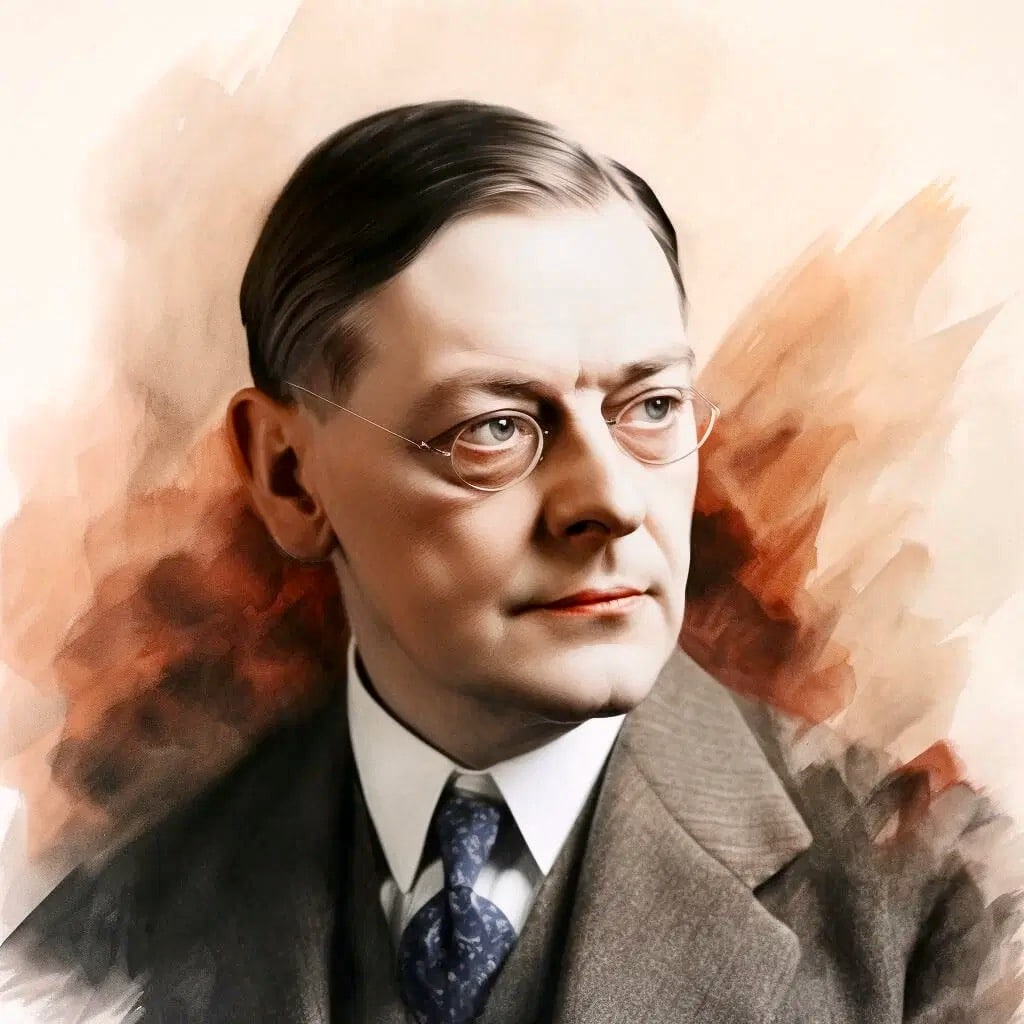T.S. Eliot
Thomas Stearns Eliot, an influential literary figure of the 20th century, was born in 1888 in St. Louis, Missouri. His education spanned from Harvard to the Sorbonne and Oxford, shaping his unique literary voice. Eliot’s relocation to England and his British citizenship were pivotal in his career, marking the beginning of significant contributions to modernist poetry, notably “The Waste Land” and “Four Quartets.”

Eliot’s early works, steeped in modernist ethos, captured the post-World War I disillusionment, contributing to his stature as a modernist vanguard. “The Waste Land,” his 1922 masterpiece, remains a cornerstone of modern literature, reflecting the era’s complexities and existential despair.
Beyond poetry, Eliot’s influence extended to drama and literary criticism, culminating in the 1948 Nobel Prize in Literature. His role at Faber & Faber was instrumental in shaping the literary landscape, supporting emerging poets and establishing his legacy in publishing.
Eliot’s personal life, especially his two marriages, profoundly influenced his literary output. His first marriage, marked by unhappiness, ended in separation, while his later years with Valerie Fletcher brought him personal contentment.
Eliot’s enduring legacy continues to resonate, with his works remaining integral to literary discourse and his contributions to poetry and criticism shaping future generations of writers and thinkers.
References:
- Britannica’s article on T.S. Eliot.
- NobelPrize.org’s biographical sketch on T.S. Eliot.
- Academy of American Poets’ overview of T.S. Eliot.
QUESTIONS FOR DISCUSSION
- How does T.S. Eliot’s background and education influence the themes and styles found in his poetry, especially in works like “The Waste Land” and “Four Quartets”?
- Eliot’s “The Waste Land” is often considered a defining work of modernist literature. What elements of this poem exemplify the characteristics of modernism, and how does it reflect the socio-cultural context of the post-World War I era?
- Discuss the role of religious motifs in Eliot’s later works, particularly in “Four Quartets.” How do these motifs contribute to the overall themes and messages of his poetry?
- Eliot was not only a poet but also a critic and a playwright. How do his critical essays, like “Tradition and the Individual Talent,” and his plays, such as “Murder in the Cathedral,” complement or contrast with the themes found in his poetry?
- Eliot’s poetry often incorporates a range of cultural, literary, and religious references. How do these references enhance the complexity and depth of his work, and what challenges do they present to readers?
- Discuss the significance of Eliot’s transition from American to British citizenship. How did this change reflect in his literary output and his perception in the literary world?
- Eliot’s work had a profound influence on the course of 20th-century literature. Can you identify any contemporary poets or writers who have been directly influenced by Eliot’s style or themes?
- Examine the structure and form of “The Waste Land.” How does Eliot’s use of fragmentation and varying perspectives contribute to the poem’s meaning and impact?
- Consider Eliot’s personal life, particularly his two marriages and their influence on his writing. Can we see reflections of his personal experiences in the themes and emotions expressed in his poetry?
- Eliot received the Nobel Prize for Literature in 1948. Discuss the significance of this award in the context of his career and the broader literary landscape of the time.
© 2024, wcadmin. All rights reserved, Writers Critique, LLC Unless otherwise noted, all posts remain copyright of their respective authors.




